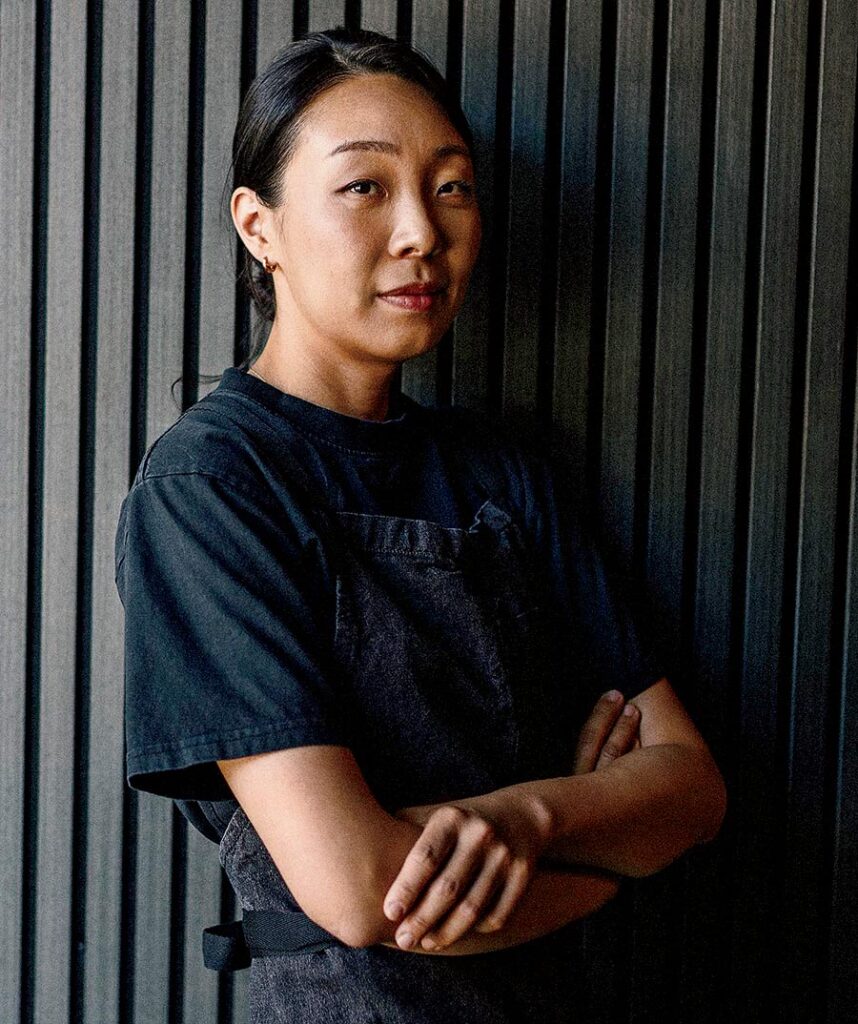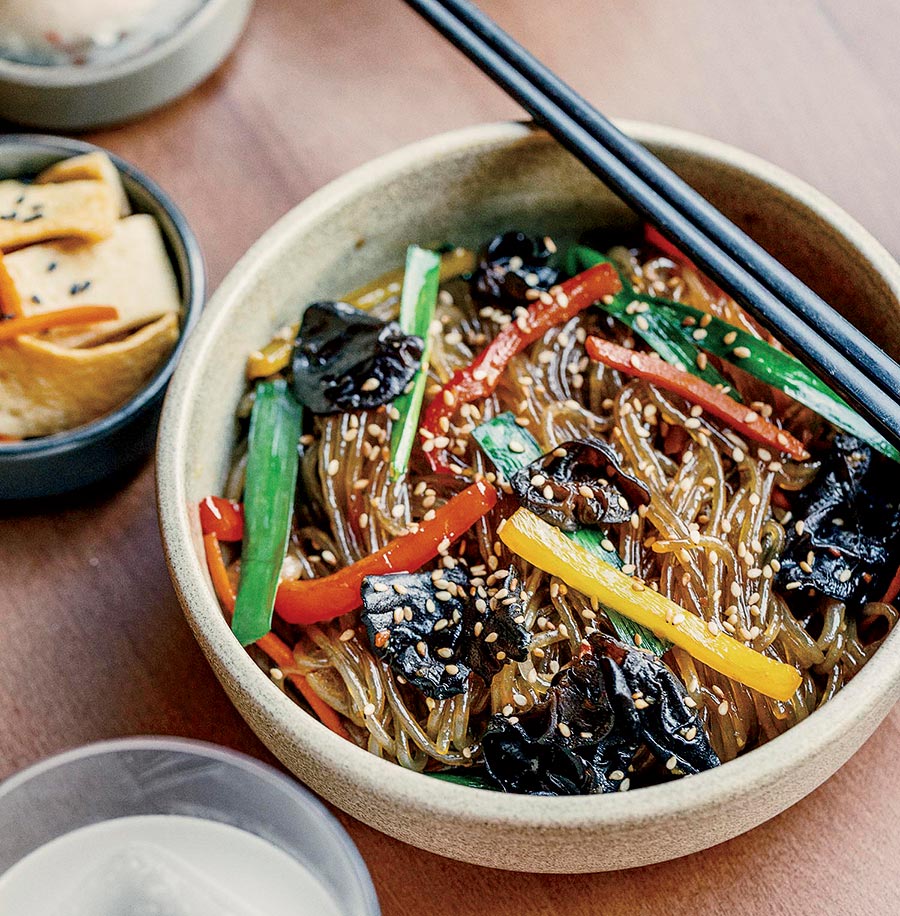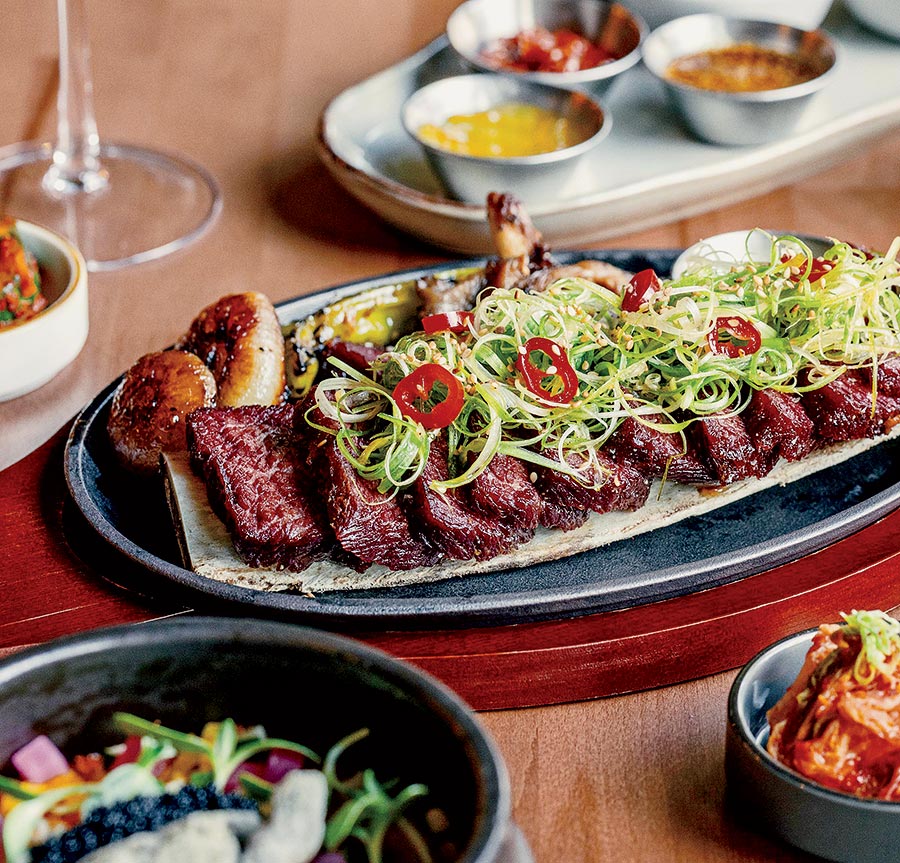There are hundreds of Korean restaurants, food shops, bars, and bakeries in greater Atlanta, and during the 20 years I lived there, I made it my mission to visit as many as possible.
At first I fell for tabletop barbecue and became a snob about the superiority of hardwood charcoal over gas. Then I turned to the specialty shops that served tofu stew (soondubu-jjigae) or hand-pulled noodles in black bean sauce (jjajangmyeon). I checked out snack shops for rice cakes and pubs for hot pots. There was even one spot where you could share platters of pork (bo ssam), rent karaoke booths, and go “cosmic bowling” on glow-in-the-dark lanes. Now, that was a party.
Somewhere in all this plenitude there were also modest storefronts where the food tasted like home cooking — places with housemade banchan, perfectly crusty stone bowl rice, and stews deep with the flavor of freshly prepared anchovy stock. Such is West Town’s Mister Tiger, for which siblings and first-time restaurateurs Charlie Park and Min Lee had a soft opening in January. Working from family recipes and a few creative impulses, Lee developed the menu, while Park took over the front of the house and devised an exciting cocktail program that uses Korean spirits in mixed drinks. Lee’s husband, Brian, an attorney, handles the investors and business side of the operation. In late May, they held the grand opening — though, truthfully, everyone already knew they were there.
When you arrive, you’ll join a diverse crowd of neighbors who appreciate the soulful cooking, warm hospitality, and (yay, yay, yay) decent prices. I’m always happy to have dinner here, whether it’s a best-in-show bibimbap and a cocktail at the bar or a full meal with a group of friends around a table, wrapping slices of juicy short rib in lettuce and clinking spoons in a shared bowl of uni rice. Still, I do have a couple of notes. The family’s inexperience in running a restaurant shows, particularly in terms of pacing and service. (I suspect the kitchen gets overwhelmed at times.) Also, while the food tastes admirably homemade, it can sometimes come off muted. I’m happy with it because so many youth-oriented Korean restaurants dial up the sugar, salt, and spice to 11, so it’s a treat to eat food that tastes Mom-approved. (You may even spy the siblings’ mother, Inae Park, in the restaurant feeding Lee’s daughter.) But if you crave more K-pop flash in your food, this may not be your jam.

Mister Tiger occupies the space that was home to the longtime neighborhood fave Two (and briefly to a location of the barbecue chain Porkchop). The look is simple and comfortable, with bare wooden tables and pendant lights spread over two rooms. The one serious pop of color comes from a fantastic neon art piece depicting a prowling, sharp-clawed tiger wearing a gat, the traditional Korean top hat.
You may think you want a Cass beer or a bottle of Jinro soju to kick off the meal, but leave those for your next trip to a Korean barbecue joint. Here, try instead one of Park’s thoughtful cocktails. The Uprooted combines plants from their mom’s garden — tomato, strawberry, minty perilla leaf — with enough gin, amaro, and citrus to put you in Last Word territory. He also makes a great Negroni variation with mezcal and bokbunja (Korean black raspberry wine), seasonal creations using fresh fruit, and a full roster of dialed-in classics. As an added bonus, complimentary banchan side dishes arrive with your drinks, so as you figure out the menu, you’re snacking on kimchi, fish cakes, and sneakily delicious Korean potato salad.
The appetizers hit familiar comfort food notes: fried mandu dumplings and silver-dollar-size kimchi pancakes, both crispy-crunchy and ready for a swipe through their respective dipping sauces. There are juicy beef meatballs in a sweet soy glaze and boneless popcorn fried chicken (dakgangjeong), the sweet and spicy version all glossy and dripping in sweet gochujang sauce. I’m more of a fried-chicken-on-the-bone guy, but if you’re a devotee of Panda Express orange chicken, I think you’ll be thrilled. The standout appetizer is a beautiful sizzling rice bowl topped with uni, all kinds of roe, colorful pickles, and diced veggies that you mix into explosively textured fishy deliciousness.
Things get more interesting once you move to the main courses, where the cooking is both heartier and more heartfelt. Lee is a short rib magician. Her galbijjim unites this unctuous cut with potatoes, carrots, rice cakes, jujubes, and shishitos in a braising liquid that’s like a knife edge of salty sweetness cutting through the ultrasoft ingredients. Even better is her woodae galbi, bone-in short ribs that are nicely chewy but yielding, hard-seared with seasoning but gushing with juices. Order this with a ssam platter — pickles, condiments, and lettuce wraps — and turn each rich slice into a glorious mouthful.

A lot of the entrées, from monkfish with bean sprouts to chicken with sweet potatoes and perilla leaf, arrive awash in gochujang sauce, which can get monotonous. So include a side dish of soybean stew chock-a-block with slices of zucchini, daikon, and shiitake, or a tasty mound of slithery japchae noodles. The portions here are so generous that you may find one main dish and one side are plenty for two people. Plus, that leaves you room for dessert. May I recommend the yuzu tiramisù, a creamy citrus concoction that’s easy to share?
Having made it my life’s work to eat as much Korean food as I can, I should point out a few other shortcomings, such as the fact that none of the stews arrive properly bubbling. They should be hot enough to cook an egg or kill Viserys Targaryen if upended on his head. Also, none of the dishes labeled “Korean BBQ” are actually cooked over an open flame.
At Mister Tiger you may not always experience the level of refinement that marks the best restaurant cooking, but no matter: You’ll surely taste the love.



